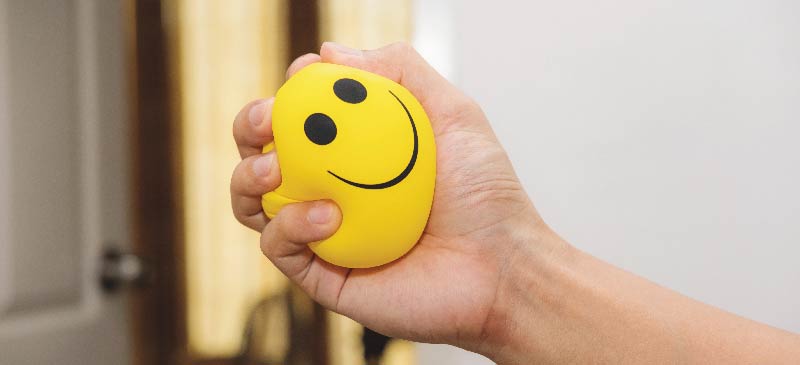The term eustress was coined in the 1970s by an endocrinologist named Hans Selye, who combined the Greek prefix EU- (meaning “good”) with stress.
Eustress, therefore, literally means “good stress.”
What is “positive stress” correctly, and how does it differ from distress in terms of its health impact?
Eustress, or good stress, is considered to be beneficial for motivation, performance, and emotional well-being.
It’s the type of stress that someone perceives as a worthwhile challenge rather than an annoyance or fearful experience.
It’s also not associated with many of the adverse health effects of chronic stress, such as digestive issues, poor sleep, and tension headaches.
What Is Eustress?
The definition of eustress is “a moderate or normal psychological stress interpreted as being beneficial for the experiencer.”
Eustress typically has the following characteristics: It motivates us, focuses our energy, is short-term, feels exciting, and improves our performance.
Since stress — the body’s response to changes that create taxing demands — comes in many forms, it can have a wide variety of effects on someone’s health and happiness.
Today, experts consider there to be two main subgroups of stressors: good and bad stress.
Research has shown that a positive mindset is critical when it comes to eustress. A stressor must be perceived by the person experiencing it to be good.
Events in life are ultimately up for interpretation — meaning that the same game or challenge may be good stress for one person and bad stress for another.
One’s interpretation of a stressful event ultimately depends on his or her current situation and feelings of control, desirability, location, and timing.
What makes a stressor beneficial is that it functions as a real challenge. It helps motivate a person toward self-improvement and reaching goals, without overwhelming her/him.
Eustress vs. Distress
What makes distress and eustress different?
As you can probably tell by now, eustress is a form of “good stress” — the type that tends to increase energy levels, health, and positive feelings — while distress is the opposite, the kind that has negative implications.
The main difference between eustress and distress is the amount of personal control that one feels over a stressor.
Distress tends to occur when a stressor cannot be resolved through coping mechanisms or adaptations.
Eustress typically enhances one’s functioning and may include responding to stressors with feelings such as:
- Increased meaning and hope (believed by some experts to be the best predictors of life satisfaction)
- Vigor and determination
- Excitement and anticipation
- Pride
- Improved life satisfaction and well-being
- Gratitude
- Resilience
On the other hand, when someone experiences a distressing event, it usually interferes with her/his ability to accomplish a job or task and quality of life. Distress can cause someone to feel:
- Chronically fatigued (also called adrenal fatigue), depleted or burnt out.
- Hopeless, withdrawn and depressed
- Scared, anxious, nervous
- Frustrated and angry
- Resentful
- Distressed people are more likely to report reduced quality of life (including at home and work), increased job pressure, more deficient coping resources, and overall perception of poorer mental health.
- Distress also makes it more likely that someone will deal with symptoms like high blood pressure, muscle tension, brain fog, headaches, and reduced immune function.
- Chronic stress has been linked to the six leading causes of death: chronic disease, accidents, cancer, liver disease, lung ailments, and suicide.
It may seem obvious, but examples of distress can include the death of a loved one, divorce, illness, injury or hospitalization, breakups, unemployment, addictions, or abuse.
You can see how this differs from events like marriage or starting a new job.
Researchers have found that both eustress and distress cause neuroendocrine changes in the body, although different types.
Catecholamines and cortisol levels change rapidly in response to stressful events, due to activation of the hypothalamic-pituitary-adrenal axis.
While cortisol (a stress hormone) can increase in response to good or bad stress, it tends to remain elevated when someone is dealing with chronic, unresolved tension.
This can be dangerous and contribute to increased oxidative stress, higher risk for disease development, and even a shortened life span.
Why Is It Good for You?
When people experience positive stress, they adopt either cognitively or physically (or both) and become healthier, more reliable, and possibly happier.
They are more likely to experience positive feelings like pride, fulfillment, and gratitude, and may become physically healthier too.
Studies also show that manageable levels of life stress may enhance psycho-biological resilience to oxidative damage.
Eustress has many things in common with hormesis, which is considered a favorable/beneficial biological response to low exposures to toxins and other stressors.
The term hormesis comes from the ancient Greek word hormáein, which means “to set in motion, impel, urge on.”
Why is eustress good for you? The reason it’s considered a form of good stress is that it’s linked with mental and even physical health improvements.
These can include:
- Improved endurance, stamina, and heart health.
- For example, many studies have found that people who engage in moderately intensive, regular exercise (a form of hormesis) experience lower levels of oxidative stress and inflammation, as well as many other benefits.
- Emotional well-being, due to experiencing more positive feelings (as described above)
- Increased self-esteem and confidence
- Improved relationships
- Enhanced work productivity
Examples of Eustress
Positive stressors can be both psychological and physical. What are some examples of eustress?
Positive stress examples in everyday life can include:
- Exercise
- Meaningful life experiences like getting married and having children
- Starting a new job
- Moving to a new location
- Studying to earn good grades and acquire a degree
- Working on meaningful projects at work that requires long hours and hard work
- Enlisting in the military (due to a sense of fostering a community)
- Joining a professional sports team
- Competing in various activities
- Working on creative projects and hobbies that are just challenging enough
- Cold exposure/cryotherapy
- Heat exposure, including the use of saunas and light-emitting lasers
- Some even consider the consumption of alcohol to be “hormetic” since it’s been tied to prevention of heart disease and stroke in moderation
In some cases, a stressor may cause both eustress and distress.
For example, having a baby, attending graduate school, or moving to a new location may be meaningful life events, but they can also be stressful.
In the long term, these are worthwhile experiences, but in a short time, it’s essential to practice naturally stress-relieving activities to help prevent feeling overwhelmed.
How to Utilize Positive Stress
One of the keys to benefitting the most from good stress is to experience it at “moderate/intermediate doses.”
Too much of any type of stress can wind up having adverse effects because it feels overwhelming, while just the right amount leads to positive adaptations.
For symptoms of eustress to be beneficial, someone has to feel that he/she is in control and that the challenge is worthwhile but accomplishable, rather than that person has no choice, is unprepared, is in danger, or is being mistreated.
Wikipedia sums this point up nicely:
Eustress occurs when the gap between what one has and what one wants is slightly pushed, but not overwhelmed. The goal is not too far out of reach but is still slightly more than one can handle. This fosters challenge and motivation since the goal is in sight.
So how can you increase eustress in your life? Remember that how you perceive your given situation determines the effect that the stressor will have on you.
Here are some tips for making the most of challenging situations:
- Increase your sense of self-efficacy and confidence (how you judge how well you can carry out a required task, action, or role), so you feel better able to handle what comes your way. You can do this by researching information, asking for help from others, learning from experts, and creating a backup plan.
- Work on getting into a state of flow while practicing an activity, which is characterized by absorption, enjoyment, and intrinsic motivation. Try to be entirely focused on a challenge, rather than distracted, which can make it more enjoyable.
- Try to view challenges in the workplace as beneficial long-term, and remember that many are temporary and improving your skillset. Studies have shown that viewing workplace tasks with a positive attitude usually increases work performance, reduces absenteeism and burnout, and benefits both employees and employers. Some companies are now using “stress management interventions” that involve exercise, meditation, and relaxation techniques to decrease distress and increase positive perceptions of stress in the workplace.
- Get comfortable with the unknown by stepping outside of your comfort zone more often and trying new things. Being comfortable with failing, and avoiding perfectionism will make it more fun to challenge yourself and learn.
- Avoid overscheduling your week, procrastination, and failing to plan, all of which make flow states less likely to occur.
- Be assertive and ask for help for more guidance if you’re unsure how to tackle an assignment.
- Be persistent, as meaningful things in life usually require commitment, time, and effort.
- Work on adopting a positive mindset and being optimistic. If you alter your mindset to view stressors as a good thing, you’re much more likely to handle them well and even appreciate them.
Conclusion
- What is eustress? It’s a term used to describe “good stress.”
- Researchers believe that the importance of eustress for living a healthy life is that it boosts motivation, physical health, pride, self-esteem, and other good feelings.
- Eustress vs. distress, what’s the difference? These two types of stress are perceived differently and can have opposite effects on the body. The main difference is the amount of personal control that one feels over a stressor.
- While distress tends to increase anxiety, fatigue, overwhelm and can have harmful physical effects, good stress usually boosts immunity, heart health, and cognitive function,
- Eustress examples in everyday life include getting a new job, getting married or having children, competing in sports or other activities, moving, and attending college or graduate school.








